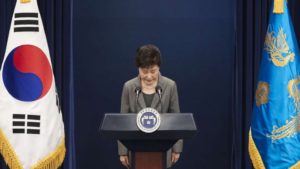by WorldTribune Staff, March 10, 2017
North Korean state media, notoriously slow when it comes to covering news outside of the country, quickly disseminated the news on March 10 that South Korea’s Constitutional Court had upheld the impeachment of President Park Geun-Hye.
The court’s ruling is widely seen as bringing to power a left-leaning government in Seoul that would likely warm ties with the communist regimes in China and North Korea while decreasing the priority on South Korea’s security ties with the United States and Japan.

The North Korean regime has reserved its harshest and often obscene invective for South Korea’s first woman president and the first popularly-elected female head of state in Northeast Asia.
Pyongyang’s state-run broadcaster Korean Central Television (KCTV) reported the news less than three hours after the court’s decision was announced.
For example, the Rodong Sinmun, an organ of the Workers’ Party of Korea (WPK), reported on U.S. President Donald Trump’s inauguration two days after the fact.
South Korea has 60 days to elect a new leader. The election, likely to be on May 9, would likely see a liberal installed after almost a decade of conservative rule, political observers in Seoul say.
South Korea’s conservatives “fear a left-wing government would destroy the alliance and jettison THAAD, the U.S.-built missile-defense system that Park committed to installing this year,” Donald Kirk, a WorldTribune.com columnist, wrote for the Wall Street Journal last month.
“The ‘Constitutional Court’ – which has been on trial for three months for the impeachment motion of Park Geun-Hye which was passed by South Korea’s ‘National Assembly’ on Dec. 9 last year – decided the impeachment of Park Geun-Hye based on the unanimous verdict by the eight-judge panel,” KCNA said.
“Park Geun-Hye is said to have been removed from the ‘presidency’ a year before her terms in office and will receive a full-fledged investigation as a common criminal in the future.”
A Seoul-based analyst said KCNA’s response time is “unprecedented,” adding that it hints at the level of North Korea’s interest in improving relations with the next South Korean president.
Terms like “mass struggle of South Koreans: and Park being investigated as “as a common criminal”, will soon be seen in DPRK’s state-controlled media as well,” Jeong Kuk-Jin, a former researcher at the MBC Unification Broadcasting Research Center told NK News.
Jeong added that he was surprised that KCNA refrained from attacking Park too graphically. In the past, North Korean state media had referred to her as an “ugly bat disgrace” and an “impudent bitch”.
A senior researcher at a Ministry of National Defense (MND) told NK News on condition of anonymity that KCNA mainly targets external readers, unlike state-run broadcaster Korean Central Television (KCTV), which delivers information to North Koreans.
“If Korean Central News Agency (KCNA) reported the news [first], it targets South Korean people,” the researcher said.
Park is the first democratically elected South Korean president to be forced from office. The Constitutional Court upheld a parliamentary vote to impeach her over a corruption and cronyism scandal.
“Park will immediately forfeit the executive immunity she enjoyed as president, meaning prosecutors can summon, question and possibly arrest her,” The Guardian reported on March 10.
